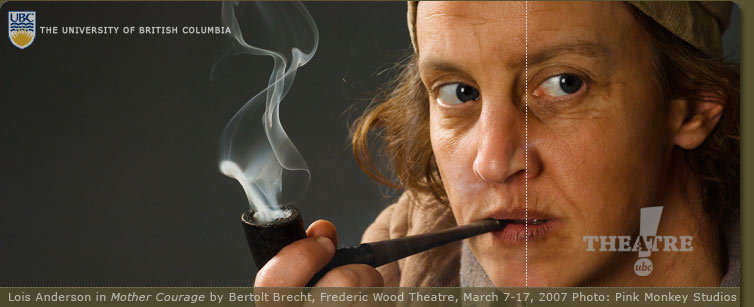ON THE SUBJECT
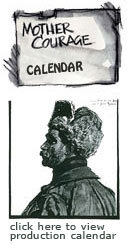
Mother Courage and Her Children
by Bertolt Brecht, translated by David Hare
Directed by Camyar Chai
With original songs by Patrick Pennefather
March 7-17, 2007
Frederic Wood Theatre
University of British Columbia
Vancouver, CANADA
All shows start at 7:30 p.m.
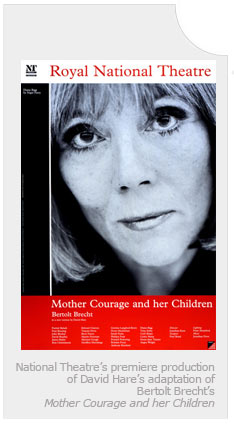 Bertolt Brecht's Mother Courage and Her Children written in 1939 is given new life by Britain's leading contemporary playwright Sir David Hare, in a powerful, gutsy, comic, colloquial, and all together extraordinary adaptation. First performed at the National Theatre in London, Hare's critically acclaimed version weaves rollicking music and dark, surprising laughter into a stunning parable. One of the most prolific, challenging, and culturally acclaimed playwrights in the theatre today, David Hare’s stage plays include Skylight, The Secret Rapture and Amy’s Room. For 35 years David Hare has written plays that capture the flavor of our times and address the interconnection between our secret motives and our public politics. Recent premieres include Via Dolorosa, a one-man show (which Hare performs) about the conflict between Palestine and Israel and Stuff Happens, which examines the 2003 invasion of Iraq. His numerous awards include the Olivier Award, London Theatre Critics' Award, NY Drama Desk Award and a knighthood for services to the theatre.
Bertolt Brecht's Mother Courage and Her Children written in 1939 is given new life by Britain's leading contemporary playwright Sir David Hare, in a powerful, gutsy, comic, colloquial, and all together extraordinary adaptation. First performed at the National Theatre in London, Hare's critically acclaimed version weaves rollicking music and dark, surprising laughter into a stunning parable. One of the most prolific, challenging, and culturally acclaimed playwrights in the theatre today, David Hare’s stage plays include Skylight, The Secret Rapture and Amy’s Room. For 35 years David Hare has written plays that capture the flavor of our times and address the interconnection between our secret motives and our public politics. Recent premieres include Via Dolorosa, a one-man show (which Hare performs) about the conflict between Palestine and Israel and Stuff Happens, which examines the 2003 invasion of Iraq. His numerous awards include the Olivier Award, London Theatre Critics' Award, NY Drama Desk Award and a knighthood for services to the theatre.
"A superbly combative new version that bristles with paradox, irony, and skepticism." - London Independent
One of the great dramatic creations of the modern stage, Mother Courage and Her Children is a both a black corrosive comedy and a profound statement against war. Set during the Thirty Years War [a religious war] the play follows Mother Courage, trailing the armies back and forth across Europe, shadowing the destruction as she sells provisions from her canteen wagon to whichever side will grease her palm. One by one, her children are devoured by war, but she will not give up her livelihood - the wagon. In this epic masterpiece Brecht pits human virtue against the business of war.
“In it’s irony, and truth, it is a work to welcome and cherish” - The New York Times
Bertolt Brecht [1898-1956] is one of the most influential dramatists of our time. He is renowned not only as a poet and playwright - but as a theatrical reformer whose epic style of theatre departed from the accepted conventions of theatrical illusion. He is credited developing drama as a social and ideological forum. Brecht formed his own company, the Berliner Ensemble, which continues today, and his many plays include The Threepenny Opera, The Life of Galileo, The Good Woman of Setzuan, The Resistible Rise of Arturo Ui and The Caucasian Chalk Circle.
“Art is not a mirror held up to reality, but a hammer with which to shape it.” Bertolt Brecht
MFA Directing candidate Camyar Chai [BFA 93] is a founding artistic director of NeWorld Theatre. Chai is a published playwright and has received a number of significant awards over the past decade for his work as a director, actor, and writer. Recent directing credits include Adrift On The Nile for NeWorld Theatre [Magnetic North Festival and VECC] as well as Bringing It All Back Home and King Richard And His Women for Theatre at UBC. Camyar wrote the libretto for the opera Elijah’s Kite, commissioned by the Manhattan School of Music. More at www.neworldtheatre.com
Called the female King Lear, Mother Courage the war-ravaged “hyena of the battlefield,” may be the most rough-and-tumble woman in all of drama. Jessie Richardson Award winning actress Lois Anderson [BFA 90] gleefully tackles the role, heading up a regiment of 17 actors – including her daughter Anoushka Anderson Kirby. The ensemble is comprised of students in Theatre at UBC’s BFA and BA Acting programs who are joined by Don Griffiths and Carlos Yamini. The production features live music by Patrick Pennefather who has created original songs. The creative team includes faculty member and award winning designer Alison Green [Costumes] with MFA candidate Rachel Stanners [Set], BFA candidates Chris Littman [Lighting] and Cassandra Tattrie [Stage Management].
Warning: Coarse language
Frederic Wood Theatre
[Gate 4 UBC Campus: 6354 Crescent Rd.]
RUN: March 7 – 17, 2007 / OPENING: Thur. March 8, 7:30 pm
CURTAIN: 7:30 pm, Mon - Sat / TICKETS: $20, $14 & $12
BOX OFFICE: 604.822.2678 More at www.theatre.ubc.ca
Parking: Rose Garden Parkade, located between Gates 3 & 4.
Park after 5:00 pm weekdays & all day Sat. and Sun. for only $3.50
MOTHER COURAGE AND HER CHILDREN
“Art is not a mirror held up to reality, but a hammer with which to shape it.” Brecht
Bertolt Brecht wrote Mother Courage in the autumn of 1939 during his Swedish exile on Lidingö Island, finishing the play in just five weeks. Written in response to Germany’s invasion of Poland, he had originally hoped to see the play presented in Scandinavia as a warning not to be drawn into what was to become World War II; but Hitler had designs on Sweden, and it proved too politically inflammatory to produce Mother Courage in Stockholm.
Two years later, on April 19, 1941, the play was triumphantly staged at Zurich’s Schauspielhaus with German actress Therese Giehse as Mother Courage. Brecht was then in Finland planning his escape to America and did not see the production. He did, however, read reviews and heard reports that the public was moved to tears by Giehse’s performance.
Instead, with his highly theatrical presentational style, he wanted them to be aware of the artifice of theatre, be entirely purged of empathy for the characters and to think about the play’s social and political implications.
Brecht was enraged. He had memorialized his theories on “epic theatre” in A Short Organum for the Theatre. Among them was that audiences not be lulled into passivity by naturalistic and sentimental productions that diminished the audience’s capacity to be intellectually engaged by the events of the play. Instead, with his highly theatrical presentational style, he wanted them to be aware of the artifice of theatre, be entirely purged of empathy for the characters and to think about the play’s social and political implications.
With Mother Courage, Brecht had two particular objectives in mind: that audiences see Anna Fierling (Mother Courage) as emblematic of an unholy alliance of war and commerce in which the pursuit of profit leads to irrevocable loss, and that audiences become indignant at the pointlessness of war and take action to stop its progress. Instead, they saw Anna Fierling as a tragic heroine with a fierce instinct for survival.
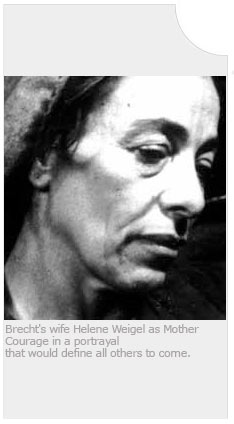 In 1949, Brecht produced and directed the play himself with his own company, the Berliner Ensemble, at the Deutsches Theatre in East Berlin. He rewrote the play, making alterations to ensure that Mother Courage would not be interpreted in a sentimental manner. Helene Weigel played the title role in a portrayal that would define all others to come, and the production launched Brecht’s reputation as the most important director of his time.
In 1949, Brecht produced and directed the play himself with his own company, the Berliner Ensemble, at the Deutsches Theatre in East Berlin. He rewrote the play, making alterations to ensure that Mother Courage would not be interpreted in a sentimental manner. Helene Weigel played the title role in a portrayal that would define all others to come, and the production launched Brecht’s reputation as the most important director of his time.
The Mother Courage Model Book, a compilation and photographic archive of his staging, detailed Brecht’s rehearsal notes and commentary on every aspect of the show. But Brecht did not expect future productions to adhere slavishly to his own. He wrote, “Anyone who deserves the name of artist is unique; he can neither be perfectly imitated nor give a perfect imitation. The use of models is a particular kind of art, and just so much can be learned from it. The aim must be neither to copy the pattern exactly nor to break away from it at once.”
In August of 2006, Mother Courage and Her Children was produced by the Public Theatre in New York City with a new translation by playwright Tony Kushner. This production was directed by George C. Wolfe. Meryl Streep played Mother Courage with a supporting cast that included Kevin Kline. This production of Mother Courage and Her Children was free to the public and played to full houses at the Public Theatre's Delacorte Theatre in Central Park. It was regarded as the hottest ticket in New York during its four week run.
Verfremdungseffekt:
Brecht's intention was to set the audience apart from familiar situations so that they may think about them objectively
Mother Courage and Her Children demonstrates Brecht's concepts of Epic Theatre and Verfremdungseffekt or "alienation". "Alienation", however, is something of a misleading translation, for it suggests that the audience is actively cut off from the performance. A more accurate translation of Verfremdungseffekt is "distancing effect" or "to make strange", since Brecht's intention was to set the audience apart from familiar situations so that they may think about them objectively.
In Brecht’s staging of the play Verfremdungseffekt was achieved through the use of placards which reveal the events of each scene, juxtaposition, actors changing characters and costume on stage, the use of narration, simple props and scenery. For instance, a single tree would be used to convey a whole forest, and the stage is often flooded with bright white light whether it's a winter's night or a summer's day. Several songs are used to underscore the themes of the play.
The action of the play takes place over the course of 12 years [1624 – 1636] represented in 12 short scenes. One is given a sense of Courage's career without being given enough time to develop sentimental feelings and empathize with any of the characters. Meanwhile, Mother Courage is not depicted as a noble character—here the Brechtian epic theatre sets itself apart from the ancient Greek tragedies in which the heroes are far above the average. With the same alienating effect, the ending of Brecht's play does not arouse our desire to imitate the main character, Mother Courage.
THE THIRTY YEARS WAR
“The [Thirty Years’] war solved no problems. Morally subversive, economically destructive, socially degrading, confused in its causes, devious in its course, futile in its result, it is the outstanding example in European history of meaningless conflict. The overwhelming majority in Europe, the overwhelming majority in Germany, wanted no war; powerless and voiceless, there was no need even to persuade them that they did. The decision was made without thought of them. Yet of those who, one by one, let themselves be drawn into the conflict, few were irresponsible and nearly all were genuinely anxious for an ultimate and better peace…They wanted peace and they fought for 30 years to be sure of it. They did not learn then, and have not since, that war breeds only war.”
- From The Thirty Years’ War, by C.V. Wedgwood, 1938
In 1618, the Hapsburg dynasty was the greatest power in Europe, ruling over Austria, Hungary, Bohemia, Spain, Portugal and large sections of France and Italy, as well as Mexico, Peru and Brazil.
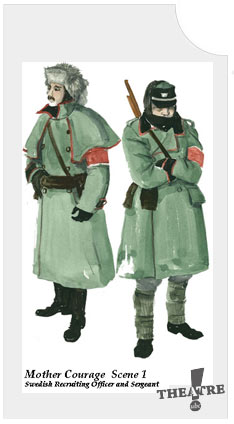 The war began with the revolt of Protestant nobles in Bohemia against the Catholic King Ferdinand (later Holy Roman Emperor Ferdinand II) and involved issues of territory, religion and succession. In the ensuing three decades, it spread throughout Europe due to the constitutional frailty of the Holy Roman Empire, the inability of the interdependent German states to act together and the ambitions of other European powers. Because the German states were the geographical and political center of Europe, their territory became the primary battleground. The result was a tremendous decrease in German population, devastation of German agriculture and the ruin of German commerce and industry.
The war began with the revolt of Protestant nobles in Bohemia against the Catholic King Ferdinand (later Holy Roman Emperor Ferdinand II) and involved issues of territory, religion and succession. In the ensuing three decades, it spread throughout Europe due to the constitutional frailty of the Holy Roman Empire, the inability of the interdependent German states to act together and the ambitions of other European powers. Because the German states were the geographical and political center of Europe, their territory became the primary battleground. The result was a tremendous decrease in German population, devastation of German agriculture and the ruin of German commerce and industry.
As Mother Courage follows the soldiers from region to region and from city to city, she perseveres in the shifting sands of political and religious fealty with cunning and sheer force of will. She could not be a stranger to the devastation of towns and cities as the war progressed and she followed the armies, selling her goods.
As Mother Courage follows the soldiers from region to region and from city to city, she perseveres in the shifting sands of political and religious fealty with cunning and sheer force of will
With the onslaught of sieges and military campaigns, the war brought with it the miseries of plague, famine and slaughter to the population. The Swedish armies alone destroyed 2,000 castles, 18,000 villages and 1,500 towns, mostly on German soil. Urban areas in Germany lost one-third of their population as marauders burned, plundered, tortured and murdered villagers in search of booty. Throughout, the largely mercenary armies had to be supported at the expense of the inhabitants. In reality, the Thirty Years’ War was not one war but a series of small wars, and the victories usually went to the generals who kept their troops best provisioned.
Bertolt Brecht’s birth city of Augsburg did not escape the brutality of the Thirty Years’ War
Bertolt Brecht’s birth city of Augsburg did not escape the brutality of the Thirty Years’ War. In 1629, Emperor Ferdinand II installed a Catholic government in Augsburg that curtailed the rights of local Protestants. In 1632, the Protestant Swedish army took the city without resistance, but when the Swedish army was routed to a nearby city in 1634, Catholic troops surrounded Augsburg. The Swedish garrison refused to surrender and a disastrous siege ensued, during which thousands died of hunger and disease. Although the signing of the Peace of Westphalia in 1648 ended this era of conflict and was an important step toward religious toleration, the incredible sufferings of the German peasantry were remembered for centuries.
CAMYAR CHAI: MFA Directing Candidate
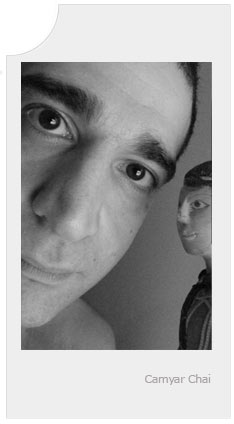 Camyar Chai earned his BFA in acting from Theatre at UBC and has worked extensively as an actor, playwright and director. He is a founding artistic producer of Neworld Theatre. Chai's recent directing credits include a project which earned the 2005 Alcan Award for the Performing Arts - Adrift On The Nile. The play premiered at the Magnetic North Festival and went on to play Vancouver at the VECC. For Theatre at UBC Chai has directed Bringing It All Back Home and King Richard And His Women.
Camyar Chai earned his BFA in acting from Theatre at UBC and has worked extensively as an actor, playwright and director. He is a founding artistic producer of Neworld Theatre. Chai's recent directing credits include a project which earned the 2005 Alcan Award for the Performing Arts - Adrift On The Nile. The play premiered at the Magnetic North Festival and went on to play Vancouver at the VECC. For Theatre at UBC Chai has directed Bringing It All Back Home and King Richard And His Women.
As a writer, Chai's works include Eljijah's Kite (Opera libretto composed by James Rolfe - premiering at the Manhattan School for Music and at Rideux Hall by invitation of the Governor General), Adrift On The Nile (with Marcus Youssef), The Adventures of Ali and Ali (with Guillermo Verdecchia and Marcus Youssef) which was published by Talon Books and Asylum of the Universe.
Chai's many acting credits include: Intelligence (TV, recurring role), Masters of Science Fiction (TV), Everything's Gone Green (Film), The Adventures of Ali and Ali (NeWorld Theatre), Hedda Gabler (Rumble Productions), Zadie's Shoes (Arts Club Theatre) and A Christmas Carol (Vancouver Playhouse).
Chai is a recipient of a University Graduate Fellowship (Masters Of Fine Arts - Theatre Directing Candidate), Ray Michal Award for “Most Promising New Director”, two Jessie Richardson Awards for playwriting (with the creators of Devil Box Cabaret and with Mara Coward for Vanunu) and a Jessie Richardson Award for Acting (with the ensemble of Western Theatre Conspiracy's Mojo).
More at www.neworldtheatre.com
BERTOLT BRECHT: a biography
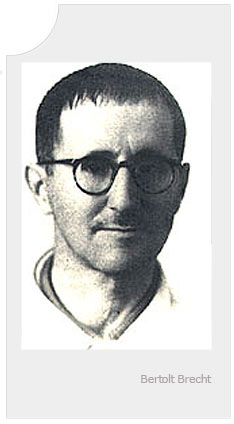 The first child of Friedrich Brecht, chief clerk in a paper factory, and Wilhelmine Friederike Sophie Brezing, the daughter of a civil servant, Eugen Berthold Friedrich Brecht was born on February 10, 1898 in the medieval city of Augsburg, Germany. A sickly child with a congenital heart condition, he suffered a heart attack at age 12. He soon recovered and continued his Latin, history and humanities education in private school, where he co-founded and co-edited a magazine. By age 16, Brecht was writing for a local newspaper and had completed the first of his 40 plays.
The first child of Friedrich Brecht, chief clerk in a paper factory, and Wilhelmine Friederike Sophie Brezing, the daughter of a civil servant, Eugen Berthold Friedrich Brecht was born on February 10, 1898 in the medieval city of Augsburg, Germany. A sickly child with a congenital heart condition, he suffered a heart attack at age 12. He soon recovered and continued his Latin, history and humanities education in private school, where he co-founded and co-edited a magazine. By age 16, Brecht was writing for a local newspaper and had completed the first of his 40 plays.
While in high school, he was almost expelled for expressing pacificist views in an essay about not defending his country in wartime
Brecht’s political thinking was already well-established by the time the First World War broke out. While in high school, he was almost expelled for expressing pacificist views in an essay about not defending his country in wartime. At 19, he was drafted and placed as a medical orderly in an emergency hospital. Deeply affected by what he witnessed there, he wrote Legend of the Dead Soldier, an anti-war ballad that the Nazi regime would later cite as the reason to deprive him of his citizenship.
While studying medicine and science at the Universität in Munich in 1917, he attended seminars on the theatre, started to write a new play, Baal, and found work as a theatre critic for a local newspaper. By 1921 he had become a serious writer, penning poems, ballads, short stories, one-act and full-length plays, and also had begun directing. In 1922 his play Drums in the Night opened at Kammerspiele Theatre, turning Brecht into an overnight success. He won the prestigious Kleist Prize and became a dramaturg for the theatre. In 1923, his plays Jungle of the Cities and Baal were both produced.
After moving to Berlin in 1924, Brecht worked as a dramaturg for Max Reinhardt’s Deutsches Theatre. By the late 1920s, Brecht had read Das Kapital and befriended Karl Korsch, a prominent Communist thinker and theoretician who taught him the essential principles of Marxism.
The Nazis, who had been persecuting Brecht for besmirching the honor of the German soldier in his Legend of the Dead Soldier, revoked his German citizenship in 1935 and burned his books.
The burning of the Reichstag took place on February 27, 1933. The next day, Brecht and his family fled to Vienna and later Denmark. The Nazis, who had been persecuting Brecht for besmirching the honor of the German soldier in his Legend of the Dead Soldier, revoked his German citizenship in 1935 and burned his books.
Fearing mounting pressure on Denmark to extradite him to Germany, Brecht moved to Sweden in 1939. When the Nazis invaded Poland, he abandoned his work on The Good Woman of Setzuan to write Mother Courage, his response to the rise of fascism and the threat of a second world war.
To further distance themselves from the encroaching war, the Brecht family fled to Finland in 1940, and the following year traveled, via Moscow and Vladivostok, to San Pedro, California. Brecht was unsuccessful in finding work in Los Angeles, writing in his diary, “For the first time in ten years, I am not working seriously on anything.”
Nevertheless, in the six years Brecht lived in Hollywood, he wrote the screenplay for Hangmen Also Die for director Fritz Lang, and the plays The Visions of Simone Machard and The Caucasian Chalk Circle. He also collaborated on a Beverly Hills production of Galileo with Charles Laughton, which was slated for Broadway.
When they accused me of wanting to steal the Empire State Building, I thought it was high time for me to leave”
Brecht was called before the House Un-American Activities Committee in October 1947 to testify on his “subversion” of Hollywood and Communist infiltration of the movie industry. Managing to evade answering the Committee’s questions, he left the United States the following day for Paris where he told a friend, “When they accused me of wanting to steal the Empire State Building, I thought it was high time for me to leave.”
Later, in Switzerland where Mother Courage had premiered in 1941, he resumed his work, setting down his thoughts, observations and theories in A Short Organum for the Theatre, which influenced theatremakers all over the world.
In 1948, having been refused entry into the American zone of occupied Germany, Brecht and Weigel went to the Soviet sector of Berlin. On January 11, 1949, he directed his own production of Mother Courage at the Deutsches Theatre with Helene Weigel in the title role. With the establishment of his own company, the Berliner Ensemble, in 1949, Brecht’s theatrical future was secured with full support from the Communist regime.
With the Berliner Ensemble, Brecht was able to put into practice his “epic theatre” techniques which distinguished the company’s dynamic theatrical approach with often-innovative stagings of contemporary and classical plays, including Shakespeare, where underlying themes of social and class conflict could be emphasized.
Brecht died of a heart attack on August 14, 1956 while working on a response to Samuel Beckett’s Waiting for Godot. He was buried, as he had requested, in the old Huguenot cemetery beneath the window of his last apartment in Berlin.
DAVID HARE
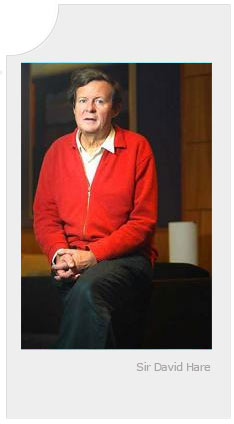 Playwright Sir David Hare was born in Bexhill, East Sussex, England on 5 June 1947, and was educated at Lancing College and Jesus College, Cambridge. He co-founded Portable Theatre Company, acting, directing and writing plays. Slag was first produced in London in 1970 at the Hampstead Theatre Club. He was Resident Dramatist at the Royal Court Theatre in London in 1970-1 and Resident Dramatist at the Nottingham Playhouse in 1973. He co-founded Joint Stock Theatre Group with David Aukin and Max Stafford-Clark in 1975. He has been Associate Director of the National Theatre since 1984.
Playwright Sir David Hare was born in Bexhill, East Sussex, England on 5 June 1947, and was educated at Lancing College and Jesus College, Cambridge. He co-founded Portable Theatre Company, acting, directing and writing plays. Slag was first produced in London in 1970 at the Hampstead Theatre Club. He was Resident Dramatist at the Royal Court Theatre in London in 1970-1 and Resident Dramatist at the Nottingham Playhouse in 1973. He co-founded Joint Stock Theatre Group with David Aukin and Max Stafford-Clark in 1975. He has been Associate Director of the National Theatre since 1984.
Over his 35-year career, David Hare has written twenty-five plays for the stage and thirteen original screenplays for cinema and television. His plays include Slag, The Great Exhibition, Brassneck, Knuckle, Teeth ‘N Smiles, The Judas Kiss, Plenty, The Secret Rapture, A Map of the World, Skylight, Amy’s View, My Zinc Bed, Pravda (with Howard Brenton), The Permanent Way and The Breath of Life.
Plays he has adapted Pirandello’s The Rules of the Game, as was Brecht’s Galileo and Chekhov’s Ivanov and Platonov. He also adapted Schnitzler’s The Blue Room. David Hare’s films for BBC television are Licking Hitler, Dreams of Hitler, Heading Home and The Absence of War. He also wrote Saigon: Year of the Cat for Thames Television.
His recent plays ...are a sharp investigation into the morality of international intervention and how the war in Iraq impacts the lives of citizens in Britain and America
His recent plays Via Dolorosa (a one man show that Hare performs) and Stuff Happens are a sharp investigation into the morality of international intervention and how the war in Iraq impacts the lives of citizens in Britain and America.
Feature film screenplays include Wetherby, Plenty, Paris by Night, Strapless, Damage, The Secret Rapture, Via Dolorosa (also acted) and The Hours. He also directed The Designated Mourner and has written the books Writing Left-Handed, Asking Around, Acting Up and Obedience, Struggle and Revolt.
Awards include the BAFTA Award (1979), the New York Drama Critics Circle Award (1983), the Berlin Film Festival Golden Bear (1985), the Olivier Award (1990), and the London Theatre Critics' Award (1990). In 1998 David Hare was given a knighthood for services to the theatre.
Sir David Hare lives in London.
